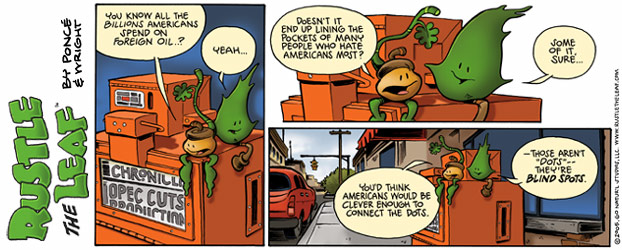WEEKLY Q: Ethical big business?
My good friend Siel at GreenLAGirl has posted a brief note about the Guardian's continued analysis of the L'Oreal / Bodyshop marriage. Turns out that as The Bodyshop owned part of the Day Chocolate company which produce the Divine Fairtrade Chocolate brand & the Dubble brand (the official Comic Relief bar) it now seems that Nestle therefore have partial ownership via L'Oreal.
Hell of a dilemma eh? Some talking points and thoughts for you.
Can a company like Nestle buy an ethical brand and still expect ethical consumers to consider it ethical?
Can we calculate the net result of helping farmers and encouraging ethical practice in global corporations versus the negative and unethical practices normally pursued by the company?
If we all start boycotting acquired ethical brands ie The Bodyshop, Green&Blacks, Divine, Tom's of Maine etc won't that do more harm than good in the long run?
Surely if a boycott occurs then unless the mainstream pick up the slack the farmers benefiting from the Fairtrade arrangement will pay the heaviest relative price?
Why do we support Fairtrade? Ethical consumerism as mainstream reality or to punish unethical companies and reward ethical companies?
Have Nestle cornered us ethical shoppers by giving us the following choice: either we punish Nestle by withdrawing support for its Fairtrade brands ergo also punishing those Fairtrade brands and the Fairtrade farmers where appropriate or we continue to support those brands regardless of who owns them and continue to support the farmers?
What is more important? The effect of Fairtrade i.e. helping farmers or the principle of not supporting unethical companies?
Isn't this actually a victory for ethical consumers? Haven't we actually forced Nestle to change as they have now gained ownership of ethical brands that they cannot manage to profitability (continued or otherwise) without maintaining the ethical standards those brands were built on?
Whose behaviour has changed: Ours or Nestle's?
MY VIEW
I support Fairtrade to support Third World Farmers. The end result is the key for me. So Nestle owning these brands, albeit partially, poses no moral problem for me as I do not care who profits from ethical consumerism as long as more farmers benefit.
I might even go as far as to argue that getting mainstream businesses to make money from ethical business is a crucial step to mainstreaming a greener fairer life.
Don't get me wrong though. Given the choice between Nestle and an independent ethical brand I will continue to choose the latter. But the mainstream marketing done on behalf of Fairtrade by mainstream companies helps to further penetrate ethical consumerism into mainstream society. Which is all a good result for the farmers and this is all about them right?
L'Oreal buying The Bodyshop and the subsequent Nestle ripples can only be seen as a victory for ethical consumerism. We are seeing more companies trade ethically and/or acquire ethical brands and in my book that gets us closer to our goal. Which is to protect more Third World farmers from the iniquities of the global economic system. Job done!
Namaste
Al
Technorati tags:
cityhippy
green
fairtrade
ethical
chocolate
CSR
nestle
L'oreal
business

































4 Comments:
You pose a very interesting question Al. I think it comes down to a simple question for me:
Is the aquired company going to be run using the same rules as before, with the hope that they can prove to the parent company that the ethical route is the one to take?
If this is the case than hopefully large companies like Nestle will see the light. People have to remember, if Fairtrade is not the main way trade is done, then it fails! Therefore the only time that Fairtrade is a success is when companies like Nestle deal with their supplies in a fair way without even thinking about it.
So if Nestle's minor ownership of the Day Chocolate company leads to them seeing the light, then great, if not and Day Chocolate changes it's way of dealing with it's suppliers, then drop them and punish Nestle.
Totally agree MGF.
The world is watching Nestle, L'Oreal, Cadbury's and they will not be able to hide from our gaze.
Lets hope they want to learn how to make money ethically. L'Oreal certainly seemed to imply that was the point of the acquisition.
Namaste
Al
Fairtrade is about cutting out middlemen and making direct links between producers and consumers.
Large corporations are about maximising profits; this is done by creating the widest gap between the cost of production and the retail price.
As such, the aims are essentially opposed.
Fairtrade is not something they'll grow into, it is a threat to their reason for existance.
They cannot act ethically except when it coincides with the maximising of profits. This is not a tendency, it is a legal obligation ('fiduciary duty').
Anita Roddick found out about that after she floated the Body Shop. She wanted to give 20% of the profits from a Glasgow soap factory to community projects. It was vetoed by the Board who accused her of 'wanting to steal money from shareholders'.
Nestle have seen the great strides made by Fairtrade and are responding. Boycotting their products does not 'do more harm than good in the long run'; if we buy their products we make a difference to the Fairtrade famers, whilst we strengthen their position as a corporation for their work with the 99% of non-Fairtrade producers they buy from.
Fairtrade seeks to increase the sum paid to producers, and whilst there is a niche market of consumers prepared to pay the premium, it's not the sort of thing they'd want to catch on industry-wide and end up driving down profits.
If I were running Nestle and wanting to do away with Fairtrade, I'd bring out a Fairtrade product and undercut my rivals until I drove them out of business. I'd then use that strong market position to degrade the standards called for in Fairtrade, I'd bring out self-certified products without proper Fairtrade standards that sound like they're a similar sort of deal (the floated Body Shop and Starbuck's both do this already).
It would bring it to a point where the term didn't mean much any more, and where even the concerned public didn't have time to investigate the full background for all the different standards so took a meaningless label on trust or else gave up altogether.
By boycotting acquired ethical brands we don't let them do this. We reinforce one of the key elements of Fairtrade; taking power away from overlarge corporations and put it back in the hands of those who produce and consume the products.
Can you think of a more effective strategy for Nestle to undermine Fairtrade that doesn't start with them having a Fairtrade product?
Merrick...that is a great comment, thanks, I will respond to it in full in a separate post soon.
Namaste
Al
Post a Comment
<< Home